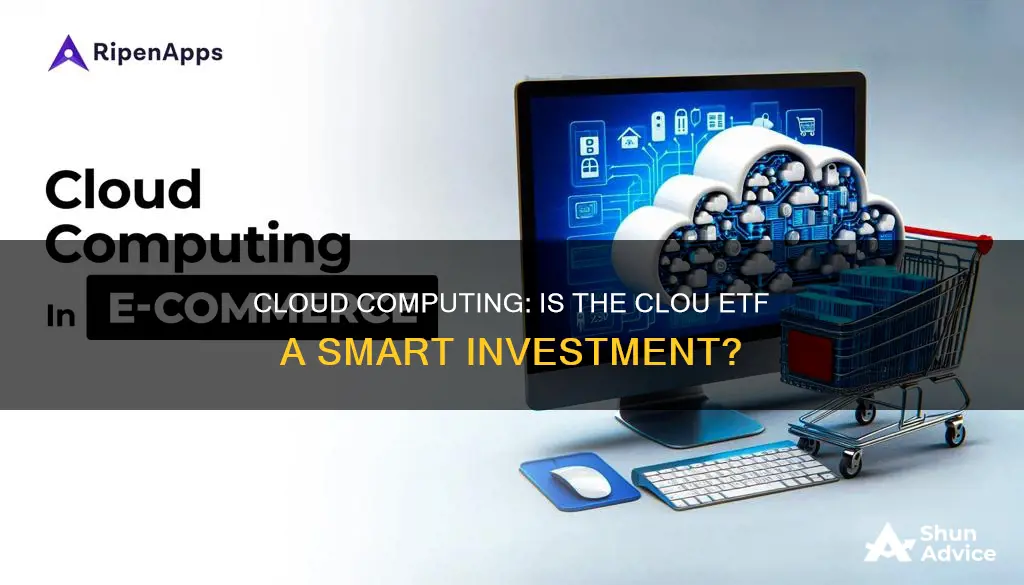
Cloud computing ETFs are a high-risk, high-reward investment option. They offer exposure to the rapidly growing cloud computing industry, which is expected to grow about 15.1% annually and become a $1.26 trillion market by 2028. Cloud computing has revolutionised the way companies manage and process data, making it more cost-effective, reliable, and secure.
There are several cloud computing ETFs available, including the First Trust Cloud Computing ETF, the WisdomTree Cloud Computing Fund, and the ARK Next Generation Internet ETF. These funds provide diversified exposure to the cloud computing industry, with varying levels of risk and potential returns.
When considering whether to invest in cloud ETFs, it is important to evaluate factors such as the fund's performance, expense ratio, and the companies it holds. Additionally, understanding the different types of cloud services, such as IaaS, SaaS, and PaaS, can help inform your investment decision.
Overall, cloud computing ETFs offer an attractive opportunity to invest in the growing cloud industry and benefit from its potential for high returns.
What You'll Learn

Cloud computing ETFs: pros and cons
Pros
Cloud computing ETFs, such as the Global X Cloud Computing ETF (CLOU), offer investors exposure to a range of companies involved in the cloud computing industry. This includes companies that license and deliver software over the internet, provide platforms for creating software, offer virtualized computing, own or manage data centres, or make or distribute related hardware.
One of the main advantages of investing in a cloud computing ETF is the potential for high growth. Increasing investments in AI are expected to boost cloud computing's share of total IT spending, and the proliferation of AI is generating vast amounts of data, which requires more cloud resources. By 2030, AI could drive more than half of all online data creation, creating opportunities for cloud providers.
Another benefit of cloud computing ETFs is their unconstrained approach. Cloud computing spans multiple segments, and ETFs like CLOU invest in companies from different sectors and geographies, including well-known names and newcomers from around the world.
Cloud computing ETFs can also provide access to companies with high growth potential. For example, CLOU's top holdings include companies like Snowflake Inc, Shopify Inc, and Zoom Communications Inc, which have experienced significant growth and are expected to continue performing well.
Cons
One of the main risks of investing in cloud computing ETFs is the potential for high volatility and overvaluation. As fashions in the sector change, cloud computing companies can experience rapid fluctuations in their stock prices. Additionally, the companies in these ETFs tend to be highly valued, and any slowdown in recurring revenue could lead to a contraction in their valuations.
Another potential drawback of cloud computing ETFs is their limited investment in the 'Big 3' cloud computing companies: Amazon, Alphabet, and Microsoft. While these companies dominate the market and have continued to grow their cloud businesses at impressive rates, they often have lower weightings in cloud computing ETFs like CLOU. This could be a missed opportunity for investors, as increasing exposure to the 'Big 3' could potentially lower risks and improve performance.
Finally, cloud computing ETFs typically have higher expense ratios compared to other funds. For example, CLOU has an expense ratio of 0.68%, which is considered high by some investors.
In conclusion, cloud computing ETFs offer investors a way to gain exposure to the high-growth potential of the cloud computing industry. However, it is important to carefully consider the risks, including the potential for high volatility, overvaluation, and limited investment in the dominant players in the market.
A Smart Guide to Investing in Dow Jones ETFs
You may want to see also

Cloud computing ETF options
The Global X Cloud Computing ETF (CLOU) is a popular choice for investors seeking exposure to the cloud computing industry. CLOU seeks to invest in companies that are positioned to benefit from the increased adoption of cloud computing technology, including those offering Software-as-a-Service (SaaS), Platform-as-a-Service (PaaS), and Infrastructure-as-a-Service (IaaS). It has a market capitalization of $373.378 million as of October 3, 2024, and a 52-week high of $23.67 and a 52-week low of $17.26.
CLOU has a unique approach, investing without regard for sector or geography. It holds companies that license and deliver software over the internet, provide platforms for creating software, offer virtualized computing, own or manage data centers, or manufacture and distribute related hardware. Firms must derive at least 50% of their revenue from these activities to be included in the ETF, although this requirement is waived for firms earning over $500 million from these sources.
One notable feature of CLOU is its limited exposure to the 'Big 3' cloud computing companies: Amazon, Alphabet, and Microsoft, which together comprise only about 5.1% of the ETF's aggregate weighting. Instead, CLOU's top holdings include Paylocity Holdings, Zscaler, Shopify, and Twilio. This strategy may be seen as a way to mitigate risks associated with high-valuation stocks.
CLOU has delivered strong returns, outperforming the First Trust Cloud Computing ETF (SKYY) by 14% over three years. However, it has also experienced volatility and underperformed the broader market in 2024, with a semi-rotation from "growth" to "value."
For investors, CLOU presents a high-risk, high-reward opportunity. Its focus on speculative growth stocks means that it could be vulnerable to a significant market event or re-valuation of its high-flying holdings. However, the expected growth in the cloud computing market, estimated at a CAGR of 17.5% from 2020 to 2025, presents a compelling investment case.
Overall, CLOU is a viable option for those seeking targeted exposure to the cloud computing industry, particularly beyond the 'Big 3' providers.
Choosing the Right ETF: A Guide to Smart Investing
You may want to see also

Cloud computing market growth
The global cloud computing market is experiencing significant growth, driven by increasing digital transformation, rising internet and mobile device adoption, and the integration of AI, machine learning, and big data. The market size was valued at USD 587.78 billion in 2023 and is projected to grow to USD 2,291.59 billion by 2032, exhibiting a CAGR of 16.5% during the forecast period.
One of the key factors driving cloud computing market growth is the increasing adoption of AI, which is generating vast amounts of data and requiring more cloud resources for storage and processing. This trend is expected to continue, with AI driving more than half of all online data creation by 2030. The COVID-19 pandemic also accelerated cloud adoption as organizations adapted to remote work and sought scalable and accessible solutions.
The cloud computing market is expected to grow at a compound annual growth rate of 21.2% from 2024 to 2030, reaching USD 2,390.18 billion by 2030. This growth is fuelled by a confluence of factors, including the realization among large enterprises of the transformative power of cloud computing in streamlining operations and improving agility and efficiency. The rise of hybrid and multi-cloud solutions is also providing businesses with the flexibility and control they need, allowing them to leverage the strengths of different cloud providers and create customized infrastructure solutions.
The increasing demand for cloud-based solutions from small and medium-sized organizations is another factor driving market growth. Cloud computing offers SMEs a cost-effective and scalable model, eliminating the need for hefty upfront investments in traditional IT infrastructure. Additionally, cloud solutions streamline operations and boost agility, enabling SMEs to adapt quickly to changing market conditions and compete more effectively.
The cloud computing market is highly competitive, with leading players such as Amazon Web Services (AWS), Microsoft Azure, and Google Cloud Platform (GCP) battling for dominance. These hyperscalers boast massive infrastructure, comprehensive service offerings, and constant innovation. They are expanding their global reach and continuously adding new features and functionalities to cater to a wide range of industries.
The cloud computing market growth is expected to continue, driven by the increasing adoption of digital technologies, the need for scalable and secure solutions, and the integration of emerging technologies such as AI, machine learning, and big data.
Farmland ETFs: Investing in Agriculture Without Buying Land
You may want to see also

Cloud computing ETF performance
Overview
The Global X Cloud Computing ETF (CLOU) is a fund that seeks to provide investment results corresponding to the price and yield performance of the Indxx Global Cloud Computing Index. It invests in companies that benefit from the increased adoption of cloud computing technology. CLOU has a high growth potential due to increasing AI investments, structural tailwinds, and an unconstrained approach spanning multiple segments and geographies.
Performance
As of January 21, 2021, CLOU had a 1-year return of 65.78%. However, its performance can be volatile, as seen in 2020 when it fell out of fashion and dropped by ~10% at one point in May. CLOU has also been upgraded to a Buy Candidate as of October 3, 2024, with a predicted 3-month rise of 2.58%.
Risks and Concerns
CLOU is considered a high-risk, high-reward investment due to the high valuations of companies in its portfolio. There are concerns about the fund's low exposure to the 'Big-3' cloud computing companies (Amazon, Alphabet, and Microsoft), which could increase risks. The expense ratio of 0.68% is also relatively high.
CLOU offers exposure to the cloud computing industry and has the potential for significant growth. However, it is a speculative investment with high valuations and low exposure to established cloud leaders. Investors should carefully consider the risks and conduct their own due diligence before investing.
Invest in Organic Farms: An ETF Guide
You may want to see also

Cloud computing ETF vs individual stocks
A cloud computing exchange-traded fund (ETF) is an investment product that focuses on companies in the cloud computing space. ETFs own stocks or other securities related to the cloud industry, and investors can purchase shares in the ETF as a means of investing indirectly in the companies' shares owned by the ETF.
Advantages of Cloud Computing ETFs
- Diversification: ETFs typically own shares in multiple companies, so if one company's stock plummets unexpectedly, losses to investors are limited.
- No need to choose stocks: The work of deciding which cloud computing company shares to buy is outsourced to the company that manages the ETF.
- Simplicity: Cloud ETFs make the investment process simple and lower your risk.
- Choice: With several different cloud ETFs to choose from, investors have plenty of options when deciding where to place financial bets about cloud computing's future.
Disadvantages of Cloud Computing ETFs
- Limited control: You can't change the investments made by the ETF, so if you have a strong hunch that a particular cloud computing company is going to increase in value, you will have no way of increasing your share of ownership in that company.
- Potential liquidity issues: ETFs may be subject to lower liquidity, which means you may not be able to sell your ETF shares immediately.
Advantages of Individual Stocks
- Control: You have full control over your investments and can increase your share of ownership in a particular company if you believe it will increase in value.
- Potential for higher profits: If there is a surge in the value of a particular stock, you will profit more from individual stocks than from an ETF.
Disadvantages of Individual Stocks
- Risk: If one company's stock plummets unexpectedly, you could lose a significant amount of money with no limit on potential losses.
- Time-consuming: You will need to spend time researching and deciding which stocks to buy.
- Lack of diversification: Investing in individual stocks does not balance out your risk in the same way that ETFs do.
Whether you choose to invest in a cloud computing ETF or individual stocks will depend on your investment goals, risk tolerance, and the amount of time and effort you are willing to put into researching and managing your investments. ETFs are a good choice if you want a simple, low-risk way to invest in the cloud computing industry, while individual stocks may be a better option if you are looking for higher potential profits and are comfortable with a higher level of risk and time investment.
Unlocking Private Credit ETF Investment Strategies
You may want to see also
Frequently asked questions
Cloud computing is the practice of using remote servers and shared resources instead of a local network for data storage, management, processing, and delivery.
There are three types of clouds: public, private, and a hybrid model.
Cloud computing has helped lower costs and improve reliability, performance, and security for business IT operations. It has also allowed companies to scale globally with greater efficiency.
Cloud computing ETFs offer high risk and high reward. The cloud industry is still growing, and it is expected to become a $1.26 trillion market by 2028. However, like any investment, there is a potential for loss.







